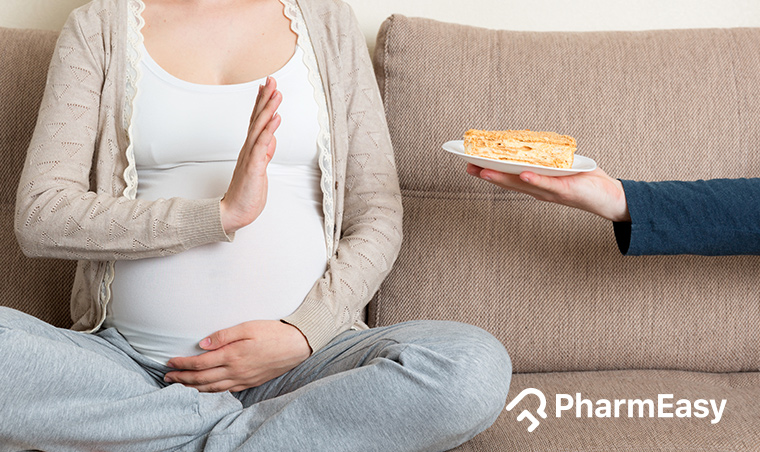What To Not Eat When You’re Expecting
By Dr. Nikita Toshi +2 more

Get,

to manage your symptom
Get your,


4 Cr+ families
benefitted

OTP sent to 9988776655



You’ve successfully subscribed to receive
doctor-approved tips on
Whatsapp

Get ready to feel your best.

Hi There,



Register to Avail the Offer
Send OTPBy continuing, you agree with our Privacy Policy and Terms and Conditions

Hi There,

Trusted by 4 crore+ families

OTP sent to 9988776655



You have unlocked 25% off on medicines




Code: NU25

By Dr. Nikita Toshi +2 more
Table of Contents
What you consume during pregnancy has an impact on both your health and the health of your baby. Doctors always recommend a healthy diet and lifestyle during pregnancy. Healthy foods such as fruits, vegetables and whole grains, nuts can help you satisfy your nutritional needs. However, you can’t just eat any fruit or vegetable, certain fruits and vegetables aren’t safe to eat during pregnancy. It is also important to know what not to eat during pregnancy.

While most fruits provide the vitamins and nutrients your body requires throughout pregnancy, especially when the fetus experiences a development spurt, some fruits may be harmful to your health. Some fruits have been documented to affect the baby’s health, while others can cause a miscarriage. Here’s a list of foods to avoid during pregnancy.
Fruits are an essential part of nutrition during pregnancy. Some people think that Tamarind and Pineapple should not be consumed during pregnancy. Experts say there is no science-backed explanation for this. However, moderation is the key. Excess citrus fruits can cause other problems related to acidity and indigestion.
Unripe papaya is said to be harmful to pregnant women and should be avoided in all trimesters. It is best to talk to a doctor or dietician about foods to avoid during pregnancy as the list may differ based on your health conditions.
Also Read: What is Anterior Placenta: A Comprehensive Insight into Maternal Health
These are some food items that are unsafe to be eaten during pregnancy. Every essential nutrient (both macro and micro) should be consumed in adequate quantities throughout the pregnancy. This will give your growing baby the proper nourishment and aid healthy development. Increase the number of fruits in your diet. If you don’t like large fruit dishes, you can eat a few with each meal. Stale, left-over, unwashed, undercooked food should be strictly avoided. Freshly prepared food and hygienic preparation methods should be incorporated into every expecting mom’s kitchen.
Disclaimer: The above information has been prepared by a qualified medical professional and may not represent the practices followed universally. The suggestions listed in this article constitute relatively common advice given to patients and since every patient is different, you are advised to consult your physician, if in doubt, before acting upon this information. Lupin Limited has only facilitated the distribution of this information to you in the interest of patient education and welfare.

Leave your comment...
Comments